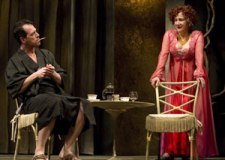Review: The Milk Train Doesn't Stop Here Anymore
 Tennessee Williams’ 1963 play The Milk Train Doesn’t Stop Here Anymore has defied success in all its previous incarnations. It flopped on Broadway not once but twice and the 1968 film adaptation—retitled Boom and starring Elizabeth Taylor and Richard Burton—fared no better. The current Off-Broadway revival being presented by the Roundabout Theatre Company, while essential viewing for Williams completists, is unlikely to salvage its reputation.
Tennessee Williams’ 1963 play The Milk Train Doesn’t Stop Here Anymore has defied success in all its previous incarnations. It flopped on Broadway not once but twice and the 1968 film adaptation—retitled Boom and starring Elizabeth Taylor and Richard Burton—fared no better. The current Off-Broadway revival being presented by the Roundabout Theatre Company, while essential viewing for Williams completists, is unlikely to salvage its reputation.
Here, the formidable Olympia Dukakis assumes the iconic role of Flora “Sissy” Goforth—an aging, widowed grande dame spending what are clearly her last days in her luxurious mountaintop villa on Italy’s Amalfi Coast. In between swilling alcohol and popping painkillers, she dictates her memoirs to her prim secretary, Blackie (Maggie Lacey).
Entering the picture is the handsome, gigolo-like Christopher (Darren Pettie), a former poet turned artist who designs mobiles. He has made a habit of attending to elderly women who have a propensity to soon kick the bucket, which has earned him the nickname of “Angel of Death.”
This hallucinatory meditation on mortality, written shortly after the death of the playwright’s longtime lover, is bizarre in the extreme. The central character, bearing elements of numerous other troubled female figures from the Williams canon, is the sort of grotesque creature for whom dressing up in full Kabuki regalia is a normal occurrence.
Adding to the camp factor is the character dubbed the “Witch of Capri,” Flora’s bitchy crony who has no compunctions about seducing everyone in sight, from her servants to the studly interloper. Although normally played by a woman, the role is entertainingly essayed here by Edward Hibbett, much in the same vein as Noel Coward in the film.
Although the play intermittently showcases Williams’ gift for blending poeticism with raucous humor, its disparate stylistic elements never fully coalesce. This rendition staged by Michael Wilson--cribbed from various drafts of the play and previously seen at Connecticut’s Hartford Stage—is certainly stylish but ultimately fails to bring cohesion to the muddled proceedings.
Dukakis manages at times to effectively convey Goforth’s grotesqueness. But her strained efforts are far too visible—the actress lacks the necessary diva-like presence to fully put the role over. Not helping matters is Pettie’s male ingénue. Although possessing serious sex appeal—his impressive physical attributes are fully revealed at one point—his blank mien makes the character no so much mysterious as simply bland.
Laura Pels Theatre, 111 W. 46th St. 212-719-1300. www.roundabouttheatre.org.
| Print article | This entry was posted by Frank on 02/04/11 at 05:36:12 am . Follow any responses to this post through RSS 2.0. |